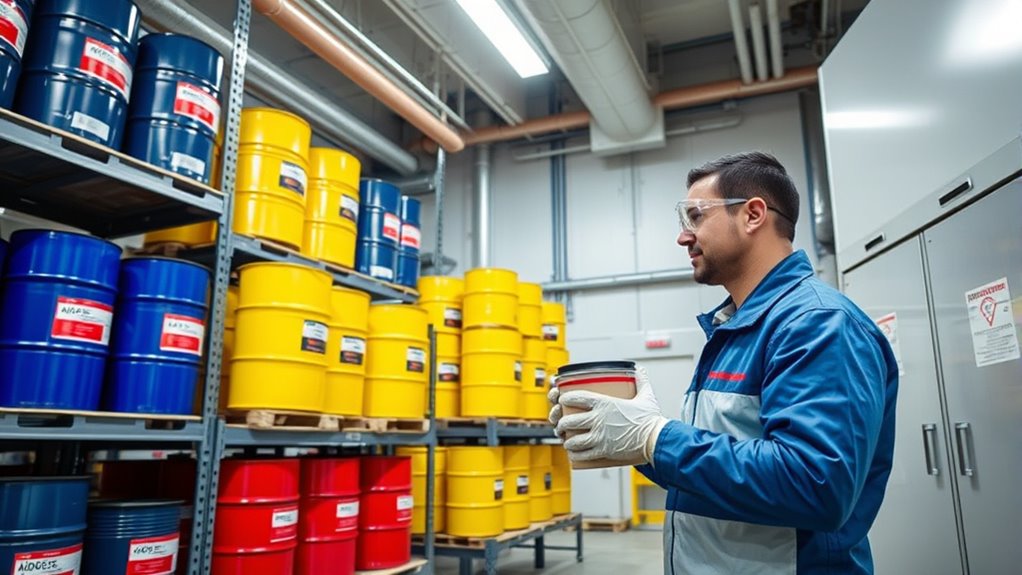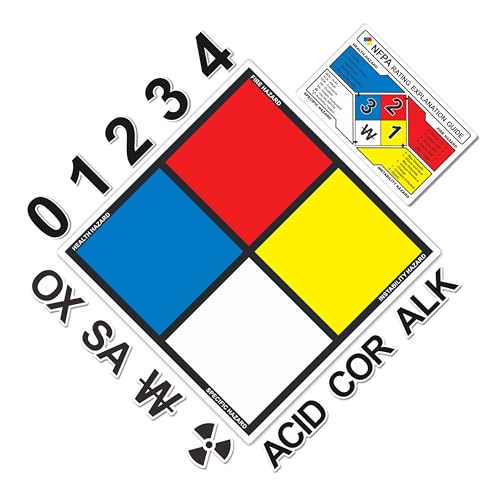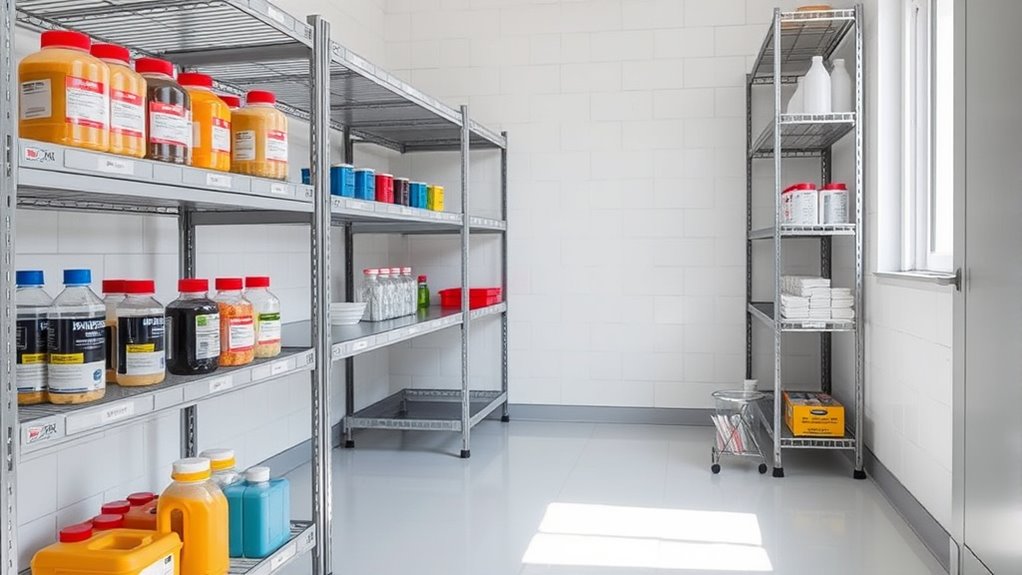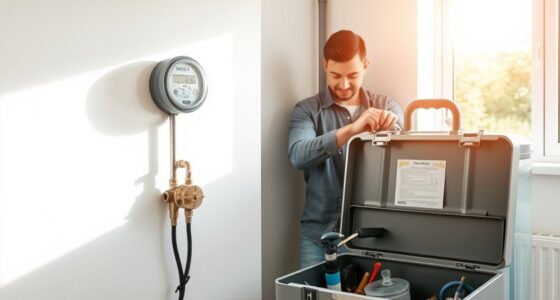To guarantee safe storage and handling of water care chemicals, always use compatible, clearly labeled containers in a well-ventilated, dry area away from heat and sunlight. Store acids separately from alkalis, and keep oxidizers away from organics or flammables. Regularly inspect containers for leaks or damage and maintain an organized inventory. Properly training yourself on emergency procedures and chemical safety helps prevent accidents. Continuing will provide you with essential tips to keep your water treatment environment safe and compliant.
Key Takeaways
- Store water care chemicals in clearly labeled, compatible containers in a dry, well-ventilated area away from sunlight and heat sources.
- Keep acids, alkalis, and oxidizers separated to prevent dangerous reactions and ensure chemical stability.
- Regularly inspect containers for leaks, corrosion, or damage; replace any compromised containers promptly.
- Train personnel on proper handling procedures, emergency response, and hazard awareness for all chemicals used.
- Maintain organized inventory and follow disposal regulations to safely manage expired or unused water treatment chemicals.

Are you storing water care chemicals safely and effectively? Handling these substances properly is essential to prevent accidents, ensure their effectiveness, and protect the environment. The first step is understanding chemical compatibility. Not all chemicals mix well, and combining incompatible substances can lead to dangerous reactions, such as explosions, toxic fumes, or chemical degradation. Always read labels carefully and store chemicals according to the manufacturer’s instructions. Keep acids separate from alkalis, and store oxidizers away from organic materials or flammable substances. By maintaining proper chemical compatibility, you reduce the risk of hazardous incidents and preserve the integrity of your chemicals.
Storage safety is equally critical. Use appropriate containers that are clearly labeled and made from materials compatible with the chemicals inside. Never use makeshift containers or repurpose food or beverage bottles for chemical storage. Ensure your storage area is well-ventilated, dry, and away from direct sunlight or heat sources, which could cause chemical breakdown or increase fire risk. Keep chemicals in a secure location, out of reach of children and pets, to avoid accidental ingestion or contact. Implementing safety measures such as secondary containment trays can contain spills and prevent contamination of other stored items or the environment.
It’s important to regularly inspect your storage area. Check containers for leaks, corrosion, or damage, and replace any compromised containers immediately. Proper labeling is vital, not just for identifying chemicals but also for understanding their hazards and handling requirements. Keep Safety Data Sheets (SDS) accessible in case you need detailed information about each chemical’s proper storage, handling, and emergency procedures. Training yourself and others who handle these chemicals ensures that everyone understands the importance of storage safety and how to respond in case of an emergency.
Additionally, establish a systematic inventory system to track quantities and expiration dates. Expired chemicals should be safely disposed of following local regulations, as they can become hazardous over time. Proper storage isn’t a one-time task; it requires ongoing vigilance. By prioritizing chemical compatibility and storage safety, you protect yourself, others, and the environment from potential dangers. This responsible approach keeps your water care chemicals effective and your facility compliant with safety standards. Remember, a well-organized and safety-conscious storage system is the foundation of safe water treatment practices.

55 Gallon Water Preserver Concentrate 5 Year Emergency Disaster Preparedness, Survival Kits, Emergency Water Storage, Earthquake, Hurricane, Safety
GUATENTEED POTENCY: Must use within 1 year of manufacturing to ensure potency (Expiration Date on Bottle)
As an affiliate, we earn on qualifying purchases.
As an affiliate, we earn on qualifying purchases.
Frequently Asked Questions
How Often Should Water Care Chemicals Be Inspected for Leaks?
You should inspect water care chemicals for leaks during routine chemical inspections, ideally at least once a week. Regular leak detection helps prevent spills, contamination, and chemical hazards. During each inspection, carefully check containers, valves, and fittings for signs of leaks or corrosion. Consistent chemical inspection guarantees safety, maintains chemical integrity, and minimizes environmental impact. Make leak detection a key part of your maintenance schedule for maximum water chemistry management.
Can Water Care Chemicals Be Stored Outdoors Safely?
You can store water care chemicals outdoors if you consider outdoor storage considerations carefully. Make sure containers are tightly sealed, kept in a cool, dry, and well-ventilated area, and protected from direct sunlight and extreme temperatures. Always check that chemical container labeling is clear and intact to prevent misuse. Regularly inspect storage areas for leaks or damage, and follow manufacturer instructions to maintain safety and chemical integrity.
What Are the Signs of Chemical Degradation Over Time?
You’ll notice signs of chemical degradation when the product shows discoloration indicators or a change in appearance, like clumping or settling. Chemical stability decreases over time, especially if stored improperly, making the chemicals less effective. Pay attention to unusual odors or a separated, cloudy, or altered liquid. These signs indicate the chemicals may no longer be safe or effective, so it’s best to replace them to maintain water quality.
How Should Spills of Water Care Chemicals Be Cleaned?
When a water care chemical spill occurs, you should act quickly for chemical spill cleanup. First, put on protective gear like gloves, goggles, and a mask. Then, contain the spill with absorbent materials and clean it up carefully, avoiding spreading the chemical. Dispose of the contaminated materials properly, following safety guidelines. Always prioritize your safety and guarantee proper ventilation during cleanup to prevent harm.
Are There Specific Storage Requirements for Different Types of Chemicals?
Did you know that improper storage accounts for nearly 30% of chemical incidents? You should store water care chemicals based on their chemical compatibility, avoiding mixing incompatible substances. Use appropriate storage container types—such as corrosion-resistant bins or sealed drums—and keep chemicals in a cool, dry, well-ventilated area. Always follow manufacturer guidelines for specific storage requirements to prevent accidents and guarantee safe handling.

Eagle 1677BLK Containment Utility Tray, 36.25" Length x 18.25" Width x 2.375" Height, Black
Affordable way to contain small spills up to 5 gallons
As an affiliate, we earn on qualifying purchases.
As an affiliate, we earn on qualifying purchases.
Conclusion
By handling your water care chemicals with care and proper storage, you’re gently safeguarding your pool’s health and your peace of mind. When you treat these substances with respect and mindfulness, you create a safer environment for everyone who enjoys your water. Remember, a little attention now prevents potential troubles later. So, keep things stored properly and follow safety guidelines—your pool and loved ones will thank you for your thoughtful approach.

How To Read A Safety Data Sheet (SDS/MSDS) Poster, 24 x 33 Inch, UV Coated Paper (Poster)
Promotes Workplace Safety: Features a detailed safety brief, offering essential guidance for workers handling hazardous chemicals, ensuring familiarity…
As an affiliate, we earn on qualifying purchases.
As an affiliate, we earn on qualifying purchases.

NFPA Adhesive Label Kit 17" tall (tip-to-tip) | Hazardous Chemical Storage & Safety Symbols | Easy Identification & Compliance, Durable Labels for Workplace Safety, Includes Placards, Digits & Symbols
Comprehensive Kit: NFPA Adhesive Label Kit includes 1 blank NFPA sign (17" tall (tip-to-tip), 12 numbers (0-4), 7…
As an affiliate, we earn on qualifying purchases.
As an affiliate, we earn on qualifying purchases.









